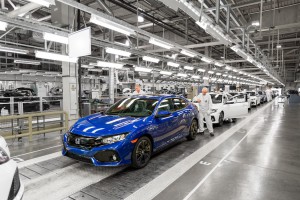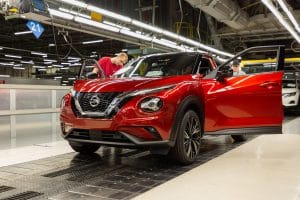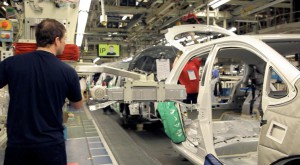
Honda’s Swindon, England facility exports much of its Civic production, including all of the hatchbacks sold in the U.S. It will close by 2022.
While the debate about when and how Great Britain will leave the European Union has upended British politics, it is also frustrating to Japanese carmakers, which represent a hefty piece of the country’s economy.
Japanese manufacturers are growing frustrated about delays in Britain’s withdrawal from the European Union, as the prolonged confusion is raising concerns about potential disruptions to their businesses and supply chains, according to the Japan Times and other Japanese news outlets.
Toyota, Honda and Nissan, Japan’s big three, all build cars in Great Britain not only for the British market, but also for export to Europe and the Americas. However, all three have reduced investment in Great Britain since the Brexit crisis began in 2016 with Honda planning to close its assembly plant in Swindon no later than 2022.
(Nissan Kicks Off Production of New Juke in Britain Despite Brexit Looming)
Britain has agreed to push back the withdrawal from the EU, previously slated for Oct. 31, to avoid a “no-deal” Brexit scenario that would disrupt the flow of goods between the Britain and the EU.

With reservations, Nissan kicked off UK production of the new Juke just two weeks before Brexit’s latest date: Oct. 31. It’s been pushed back to January 2020.
Brexit, according to the latest reports from Europe, has been pushed back until the end of January 2020. However, the matter remains in doubt because there could be a parliamentary election in Britain in December, adding more uncertainty to what business leaders consider an unstable political climate.
Many Japanese companies have been stockpiling parts in anticipation of a worst-case scenario, as supply chains for manufacturers would be severely affected by such a no-deal Brexit according to Nippon.com.
Automakers were especially wary of a no-deal scenario, as some 20,000 to 30,000 parts are necessary to build an automobile. To combat this, Honda Motor Co. increased stockpiles of parts at its British factories ahead of the October deadline to about three days’ worth of goods.
(No-Deal Brexit Portends Disaster, Japanese Minister Portends)
Toyota Motor Corp. also increased its stocked parts and will suspend operations at its British plants on Nov. 1, to prepare for any unexpected turn of events. However, Toyota sees limits to its ability to deal with a potential crisis, as the company employs a just-in-time manufacturing system (JIT) that sees parts used in the manufacturing process delivered as they are needed for better efficiency.
“It is possible that a no-deal departure could halt our British plant operations for several weeks,” a company official said.

Toyota officials are prepared to exit their facilities in Great Britain, including their production facility in Burnaston, if Brexit-related problems crop up.
The trade ministry and the Japan External Trade Organization, or JETRO, set up a hotline earlier this month to support companies affected by Brexit. The initiative gives advice mainly to small companies, including parts makers, on ways to deal with potential disruptions to the flow of goods in the event of Britain’s departure from the EU.
“We listen to individual concerns (from companies) and show them measures taken by other companies and others,” a trade ministry official said.
The prolonged confusion on the fate of Brexit also threatens to impair companies’ abilities to craft strategies in the European market.
(Toyota Warns Brexit Could Lead to Exit from Great Britain)
“We are waiting for a clear announcement on trade relations between Britain and the EU,” a Nissan Motor Co. representative told the Japan Times, calling for clarity amid growing uncertainty over Brexit.
